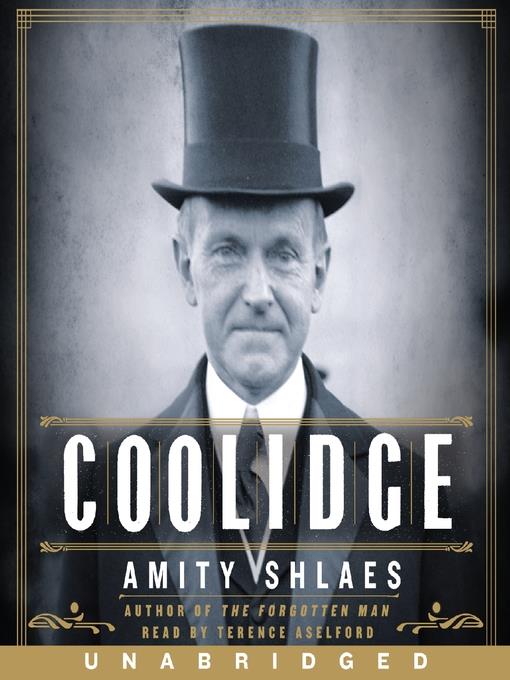
Coolidge
کتاب های مرتبط
- اطلاعات
- نقد و بررسی
- دیدگاه کاربران
نقد و بررسی

November 26, 2012
Reading perceived weaknesses as strengths and persistent setbacks as evidence of perseverance, journalist Shlaes (The Forgotten Man) glowingly portrays Coolidge as an unappreciated economic hero. Born in Vermont in 1872, Coolidge studied law in Northampton, Mass., married schoolteacher Grace Goodhue, and doggedly climbed the Republican political ladder. From governor of Massachusetts to vice president and then president of the United States, Coolidge distanced himself from the progressive elements of his party; he championed low taxes, small government, and commerce as the foundations of prosperity. Shlaes writes with crisp, engaging prose, and her keen eye for detail is rooted in a solid collection of source material. But the story's unrelenting linear trajectory bounces between such disparate topics as tax policies, maple syrup, and aviation with little indication of the degree of importance. Shlaes's reluctance to critically analyze Coolidge's political policies and actions is especially evident in her avoidance of delving into what Coolidge may have known about the Harding scandals and about weaknesses in the economy. Shlaes successfully shows, through clear explanations of Coolidge's fiscal policies, why modern-day conservatives should consider him an economic hero, but she fails to illuminate what it meant for all Americans to Keep Cool with Coolidge during the complex 1920s. 16-page b&w photo insert. Agents: Sarah Chalfant, Scott Moyers, Adam Eaglin, and Andrew Wylie, the Wylie Agency.

February 15, 2012
Director of the George W. Bush Institute's economic growth project and author of the New York Times best-selling The Forgotten Man: A New History of the Great Depression, Shlaes presents our 30th President as a model to emulate during these economically stressed times. One biography that might provoke fierce discussion in book clubs; with a one-day laydown on June 26 and a 150,000-copy first printing.
Copyright 2012 Library Journal, LLC Used with permission.

February 15, 2013
Calvin Coolidge is one of our most hazily remembered presidents. He was reserved but strong willed and a man of conviction. Shlaes (syndicated columnist, Bloomberg View; The Forgotten Man: A New History of the Great Depression) shows that there are lessons in Coolidge's time as chief executive for how a determined president can cut the budget if he tries. Coolidge, a flinty Vermonter, moved to Massachusetts to practice law. His quiet intelligence got him elected to a series of offices, including the top one. As Massachusetts governor, he put down the Boston police strike, during which the police attempted to hold the government hostage. That got him national press, the vice presidency, and, upon President Harding's death in 1923, the White House. VERDICT In spite of Coolidge's seeming inscrutable nature, Shlaes does an excellent job of bringing him to life. Her book is accessible but scholarly. Its bibliographical essay is an excellent guide for further reading. A good biography of a president undergoing historical reassessment; recommended.--Michael O. Eshleman, Hobbs, NM
Copyright 2013 Library Journal, LLC Used with permission.

November 15, 2012
President from 1923 to 1929, Calvin Coolidge (1872-1933) is traditionally dismissed as an honorable mediocrity, but journalist Shlaes (The Forgotten Man: A New History of the Great Depression, 2007, etc.) argues that he was better than that. The author makes a convincing case, but readers who don't share her conservative views may not agree that he was superior to FDR, whom she skewered in The Forgotten Man. Raised in rural Vermont, Coolidge practiced law in Massachusetts. His celebrated New England reserve describes him accurately, but he was popular and flourished in Republican state politics. Progressive at first, he steadily grew less so, backing William Howard Taft against Theodore Roosevelt in 1912. As governor, he achieved national fame and the vice presidency by crushing the 1919 Boston police strike. Taking over after President Warren Harding's death, Coolidge set to work reducing federal taxes, expenses and personnel. By contemporary standards, he was a moderate. His opposition to business regulation and social programs provoked only modest controversy. Times were prosperous, and he got the credit and became very popular. Clearly an admirer, Shlaes stresses that, under Coolidge, the budget was balanced, tax cuts reduced the top rate by half, the national debt fell, and unemployment remained below five percent. Wages rose and interest rates fell, as well, so the poor had jobs and could borrow money more easily. Most historians portray the 1920s as a simpler time, but the author maintains that Coolidge's hands-off, minimal government, free-market approach remains ideal. Republican VP candidate Paul Ryan provides an enthusiastic endorsement, and like-minded readers will find Shlaes' well-researched but highly opinionated biography deeply satisfying.
COPYRIGHT(2012) Kirkus Reviews, ALL RIGHTS RESERVED.

December 1, 2012
Rated below average in historians' polls, Calvin Coolidge was a satisfactory president to the 1920s electorate, which certainly would have voted him back had he run in 1928. That he declined fit with the self-restraint of Coolidge, whose roots in rural Vermont Shlaes explores in this comprehensive biography. She infuses her narrative with Coolidge's abhorrence of debt and practice of parsimony, personal principles he scaled up to federal size with his budget-cutting, tax-reducing policies. In addition to frugality, law and order was another salient Coolidge precept, which made him presidential timber when, as Massachusetts governor, Silent Cal broke a Boston police strike with the lapidary saying, There is no right to strike against the public safety by anybody, anywhere, anytime. Behind the stern public visage, Shlaes shows a Coolidge of feelings, close to his father, pained by the deaths of a sister and a son, and, at times, jealous of his attractive, gregarious wife. Wedged between Progressives and New Dealers, Coolidge may be fated to be a laissez-faire anachronism, but one whose record Shlaes meticulously and fluidly presents for history readers to judge.(Reprinted with permission of Booklist, copyright 2012, American Library Association.)

























دیدگاه کاربران